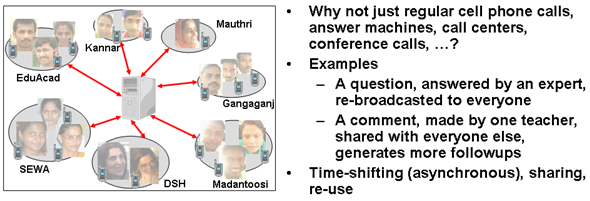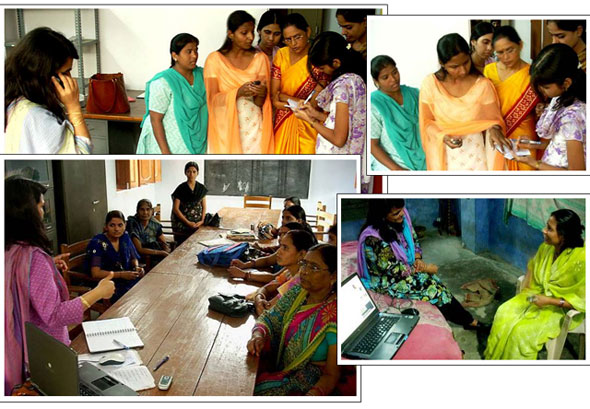The DSH Voice Forum: How Does It Work?
We call the system we are building the "DSH Voice Forum." In its simplest form, functionally, here's how it works. At times picked by participating teachers, the system calls the teachers (so the call is free to the teachers). During such a call, a teacher hears a message left on the system earlier (and stored in a voice database) by others, and after that, she gets to optionally record a message of her own (to be hard by others) before hanging up.
Here are some example calls made on a prototype system that we have been piloting. A teacher from an urban slum school says: "Girls as young as twelve years old get married off in my school. This is wrong. When I hear this, I visit the girls' families and talk to the parents to try to stop or delay the marriages. I think all the teachers should do this."
A few days later, a rural teacher follows up with this message: "Yes, girl students are treated unfairly. Parents tell us that girls need to help in the field during harvest season; otherwise, they say they will starve. But parents are much less likely to say the same thing about boys."
This lively thread continues for about a month, with teachers from all the schools chiming in with their own experiences. Towards the end of the thread, yet another teacher says: "This discussion has been wonderful. This kind of conversation would never have occurred in our school or in our village if we hadn't heard it on the voice forum."

About 15% to 20% of the participant teachers are active contributors; the rest are "lurkers"--they listen diligently but seldom speak up. This is not unexpected--one of the intended purposes of the system is to get some of the more passive and less progressive participants to learn from the more proactive ones, for without the voice forum, it's not easy for someone in a one-teacher school in the middle of nowhere to have role models to look up to.
We have also placed "phone radio boxes" in some of our schools: these are phone boxes that are equipped with amplified speakers and microphones. Such a box allows student group activities such as singing, science question, and poetry reading competitions; so students at a small isolated single-teacher school can compete against kids elsewhere.
We have started working with state teacher training institutes so that the trainers and trainees at these institutes will participate in the voice forum as well. As we allow selective "cross talk" between regular teachers' groups and the trainees' groups, the trainees may benefit from experiences and insights gained in real schools. This contributes to much needed reform at the training institutes, which have been traditionally disconnected from real school environments.
Yet another group that will gain their own voice forum is a local grassroots HIV/AIDS awareness campaign organization: the organization works along highways where professions such as truckers and sex workers have played major roles in spreading the virus. The voice forum will allow the villagers, staff, and health professionals elsewhere to share their concerns and knowledge.